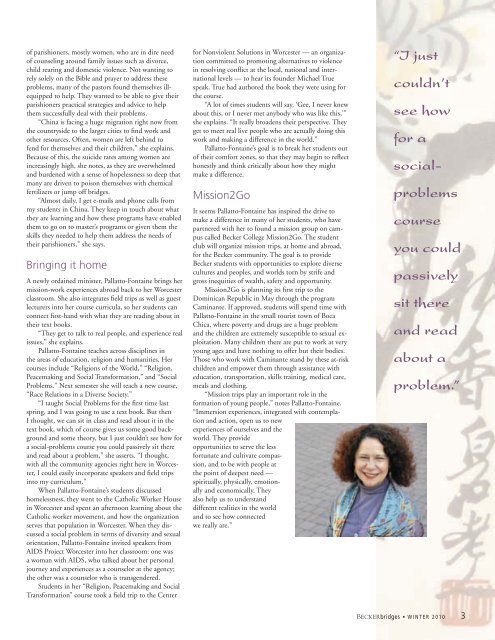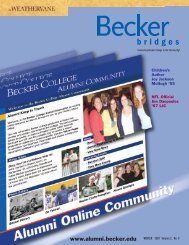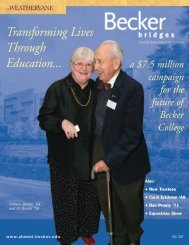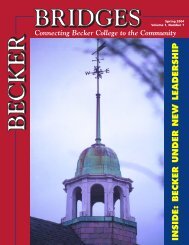Create successful ePaper yourself
Turn your PDF publications into a flip-book with our unique Google optimized e-Paper software.
of parishioners, mostly women, who are in dire need<br />
of counseling around family issues such as divorce,<br />
child rearing and domestic violence. Not wanting to<br />
rely solely on the Bible and prayer to address these<br />
problems, many of the pastors found themselves illequipped<br />
to help. They wanted to be able to give their<br />
parishioners practical strategies and advice to help<br />
them successfully deal with their problems.<br />
“China is facing a huge migration right now from<br />
the countryside to the larger cities to fi nd work and<br />
other resources. Often, women are left behind to<br />
fend for themselves and their children,” she explains.<br />
Because of this, the suicide rates among women are<br />
increasingly high, she notes, as they are overwhelmed<br />
and burdened with a sense of hopelessness so deep that<br />
many are driven to poison themselves with chemical<br />
fertilizers or jump off bridges.<br />
“Almost daily, I get e-mails and phone calls from<br />
my students in China. They keep in touch about what<br />
they are learning and how these programs have enabled<br />
them to go on to master’s programs or given them the<br />
skills they needed to help them address the needs of<br />
their parishioners,” she says.<br />
Bringing it home<br />
A newly ordained minister, Pallatto-Fontaine brings her<br />
mission-work experiences abroad back to her Worcester<br />
classroom. She also integrates fi eld trips as well as guest<br />
lecturers into her course curricula, so her students can<br />
connect fi rst-hand with what they are reading about in<br />
their text books.<br />
“They get to talk to real people, and experience real<br />
issues,” she explains.<br />
Pallatto-Fontaine teaches across disciplines in<br />
the areas of education, religion and humanities. Her<br />
courses include “Religions of the World,” “Religion,<br />
Peacemaking and Social Transformation,” and “Social<br />
Problems.” Next semester she will teach a new course,<br />
“Race Relations in a Diverse Society.”<br />
“I taught Social Problems for the fi rst time last<br />
spring, and I was going to use a text book. But then<br />
I thought, we can sit in class and read about it in the<br />
text book, which of course gives us some good background<br />
and some theory, but I just couldn’t see how for<br />
a social-problems course you could passively sit there<br />
and read about a problem,” she asserts. “I thought,<br />
with all the community agencies right here in Worcester,<br />
I could easily incorporate speakers and fi eld trips<br />
into my curriculum.”<br />
When Pallatto-Fontaine’s students discussed<br />
homelessness, they went to the Catholic Worker House<br />
in Worcester and spent an afternoon learning about the<br />
Catholic worker movement, and how the organization<br />
serves that population in Worcester. When they discussed<br />
a social problem in terms of diversity and sexual<br />
orientation, Pallatto-Fontaine invited speakers from<br />
AIDS Project Worcester into her classroom: one was<br />
a woman with AIDS, who talked about her personal<br />
journey and experiences as a counselor at the agency;<br />
the other was a counselor who is transgendered.<br />
Students in her “Religion, Peacemaking and Social<br />
Transformation” course took a fi eld trip to the Center<br />
for Nonviolent Solutions in Worcester — an organization<br />
committed to promoting alternatives to violence<br />
in resolving confl ict at the local, national and international<br />
levels — to hear its founder Michael True<br />
speak. True had authored the book they were using for<br />
the course.<br />
“A lot of times students will say, ‘Gee, I never knew<br />
about this, or I never met anybody who was like this,’”<br />
she explains. “It really broadens their perspective. They<br />
get to meet real live people who are actually doing this<br />
work and making a difference in the world.”<br />
Pallatto-Fontaine’s goal is to break her students out<br />
of their comfort zones, so that they may begin to refl ect<br />
honestly and think critically about how they might<br />
make a difference.<br />
Mission2Go<br />
It seems Pallatto-Fontaine has inspired the drive to<br />
make a difference in many of her students, who have<br />
partnered with her to found a mission group on campus<br />
called <strong>Becker</strong> <strong>College</strong> Mission2Go. The student<br />
club will organize mission trips, at home and abroad,<br />
for the <strong>Becker</strong> community. The goal is to provide<br />
<strong>Becker</strong> students with opportunities to explore diverse<br />
cultures and peoples, and worlds torn by strife and<br />
gross inequities of wealth, safety and opportunity.<br />
Mission2Go is planning its fi rst trip to the<br />
Dominican Republic in May through the program<br />
Caminante. If approved, students will spend time with<br />
Pallatto-Fontaine in the small tourist town of Boca<br />
Chica, where poverty and drugs are a huge problem<br />
and the children are extremely susceptible to sexual exploitation.<br />
Many children there are put to work at very<br />
young ages and have nothing to offer but their bodies.<br />
Those who work with Caminante stand by these at-risk<br />
children and empower them through assistance with<br />
education, transportation, skills training, medical care,<br />
meals and clothing.<br />
“Mission trips play an important role in the<br />
formation of young people,” notes Pallatto-Fontaine.<br />
“Immersion experiences, integrated with contemplation<br />
and action, open us to new<br />
experiences of ourselves and the<br />
world. They provide<br />
opportunities to serve the less<br />
fortunate and cultivate compassion,<br />
and to be with people at<br />
the point of deepest need —<br />
spiritually, physically, emotionally<br />
and economically. They<br />
also help us to understand<br />
different realities in the world<br />
and to see how connected<br />
we really are.”<br />
“I just<br />
couldn’t<br />
see how<br />
for a<br />
social-<br />
problems<br />
course<br />
you could<br />
passively<br />
sit there<br />
and read<br />
about a<br />
problem.”<br />
BECKERbridges WINTER <strong>2010</strong> 3






